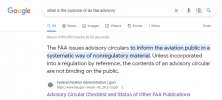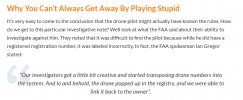This thread makes much about something you've called a "flyaway", but doesn't define it.
What is this "flyaway" that you've imagined that would require notification to the NTSB?
Is it something real and likely to happen?
What could they do about it?
Would you be able to contact them before the battery ran out and the drone was back on the ground?
First, look at the title of the thread. I didn't make up a word. Nor have I "imagined" it.
Second, read the NTSB advisory. It tells you pretty much what a flyaway is. But I'll be happy to provide a definition as best I can.
Flyaway: the act of a UAS taking a flight path not directed by the RPIC and not defined by the UAS itself. For example, if the UAS flight path, in case of a control failure, is set to immediately descend, or to return "home" and that is what takes place, then that is not a flyaway. Any other flight path is a flyaway.
Third, no it is not
likely to happen. If it was likely to happen, then UASs would be banned for safety reasons. But it
can happen and when it does, the NTSB reporting requirement takes effect.
Fourth, "they" cannot do anything about it. But they can record the make, model, serial number and other data associated with the event. This is a potentially important datapoint as mentioned previously.
Fifth, of course not but that is not the point of the reporting requirement.
Sixth, in spite of the concrete presentation of the NTSB advisory report, the slide from the most reputable 107 course available, and explanations (from someone who spent years as a CFII) of why the reporting requirement exists, there remain persons on this thread who refuse to accept it. 107 pilots are required to follow NTSB reporting requirements.
Hope that answers your questions.












